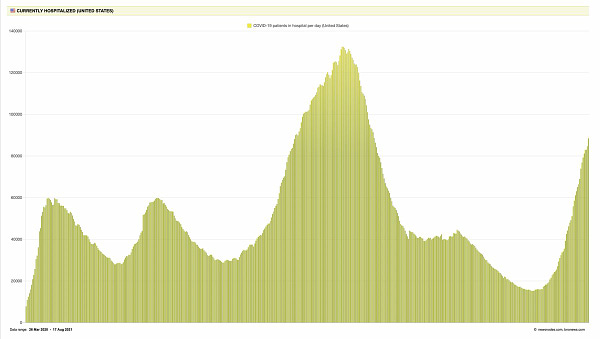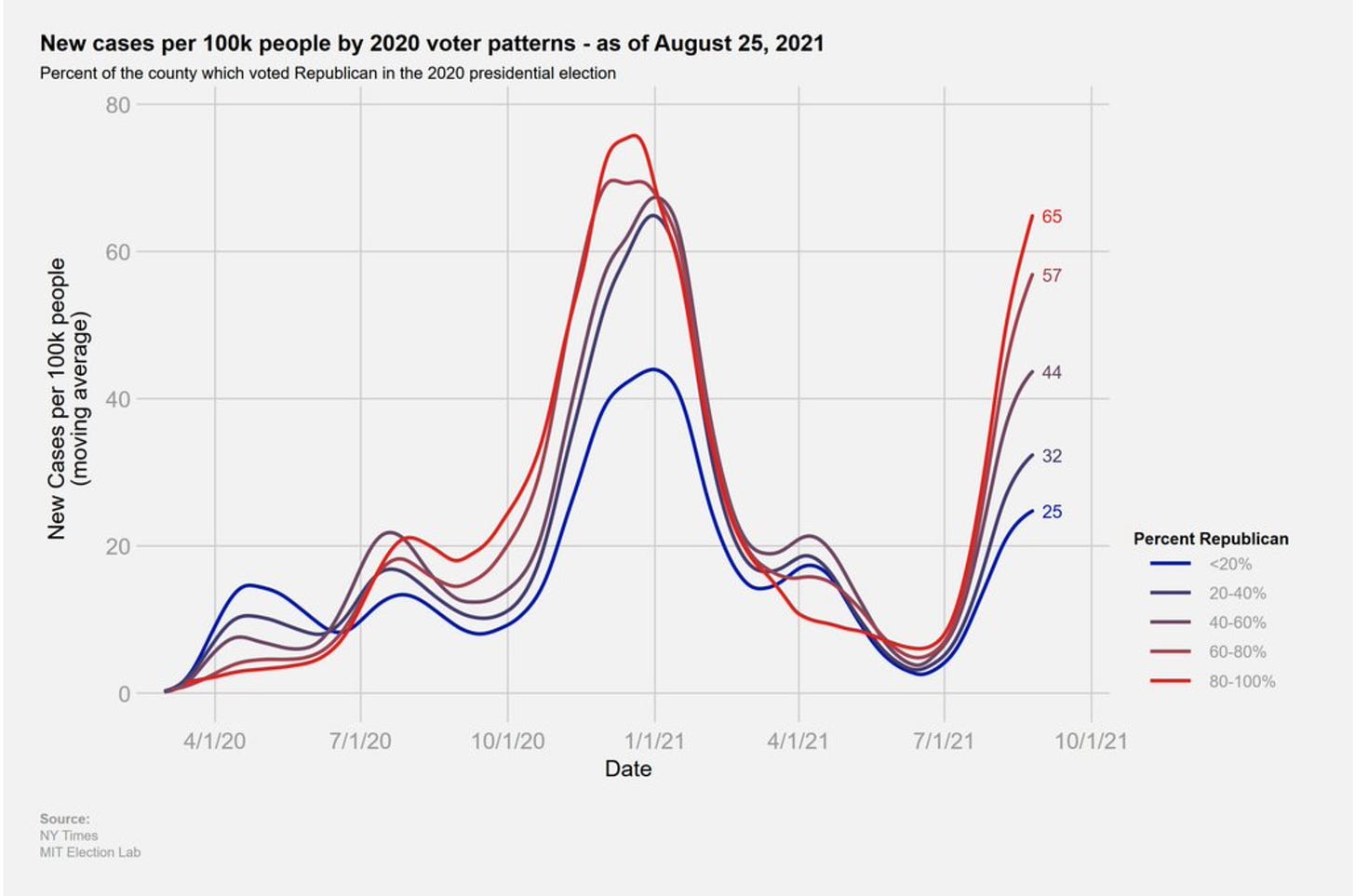First:
The batshit insanity of the Republican Party on full display:
Neoliberal: ’This graph is incredible. Dying to own the libs: <https://twitter.com/ne0liberal/status/1430977537044267008>
Plus:
The core of fascism: the belief that the real nation is dead—or under severe threat—and needs to be revived by a strong leader to vanquish its enemies foreign and domestic:
Abel Sterling: What Is Fascism—& Why the Definition Matters: ‘The label “fascism” gets tossed around a lot—but that doesn’t mean it lacks a coherent definition, or belongs solely to a bygone past. The political formation we call fascism is still very much alive, and very dangerous…. In the 20th century, fascism only became a powerful force when liberalism failed. The First World War threw Europe into social and political chaos…. If we want a general framework for what fascists actually believed, or believe, historian Roger Griffin’s 1991 definition, now almost a cliché, is genuinely helpful. In his book A Fascist Century, Griffin identifies fascism as a political ideology “whose mythic core… is a palingenetic form of populist ultra-nationalism.” The unusual term “palingenetic” refers to central narratives of national “rebirth.” In another useful formulation, Griffin writes that fascism might be defined as “a revolutionary form of nationalism driven by the myth of the nation’s imminent rebirth from decadence.” Emerging from illiberal, anti-democratic, and (mostly) counter-Enlightenment 19th intellectual traditions, fascism opposed liberalism’s universalist emphasis on reason, the rule of law, individual autonomy, and pluralistic representative democracy…. The fascist understanding of the nation and its place in the world relies on fundamental, Manichean binaries: the distinction of Us and Them, with the boundaries of the nation (Us) enforced through violence. Fascism’s Us consists of the true members of the nation, standing together to oppose Them, the sinister Other who threatens…
LINK: <https://www.currentaffairs.org/2021/06/what-is-fascism-and-why-the-definition-matters>
One Video:
Gillian Tett, Steven Ciobo, J. Bradford DeLong, John Hagel, Alejandro Ramirez Magaña, & Stephen Schwarzman (2017): Globalization in the Crosshairs: ’In the 20 years leading up to the financial crisis, international trade grew at twice the rate of global output. Since then, trade has struggled to recover. Recent data is more worrying still, suggesting that trade’s share of global GDP is falling. With mainstream political support for multilateral trade deals diminishing and populist movements on the rise in the U.S. and Europe, it is time to examine the future of globalization. Panelists will consider the following questions: Has international trade—and globalization more broadly—entered a period of stagnation or even reversal? Once unleashed, can globalization ever reverse or are we just seeing a slowdown in a normal cycle? What are the implications for the global economy and the international economic order?… <https://www.youtube.com/watch?v=fPDH_R2Chbk>:
Very Briefly Noted:
Explorable Explanations <https://explorabl.es/>
Stefan Zweig (1927): The Tide of Fortune: Twelve Historical Miniatures<https://ia601608.us.archive.org/2/items/in.ernet.dli.2015.527575/2015.527575.The-Tide_text.pdf> (London: Cassell & Company Limited, 1940 [1927])
Stefan Zweig (1927): The Tide of Fortune: Twelve Historical Miniatures<https://ia601608.us.archive.org/2/items/in.ernet.dli.2015.527575/2015.527575.The-Tide_text.pdf>
Stefan Zweig (1943): The World of Yesterday: An Autobiography<https://ia801609.us.archive.org/21/items/in.ernet.dli.2015.176552/2015.176552.The-World-Of-Yesterday_text.pdf>
Stanley M. Elkins & Eric McKitrick (1993): The Age of Federalism: The Early American Republic, 1788–1800<https://archive.org/details/ageoffederalism00elki>
Alan Cole & Tim B. Lee: Full Stack Economics <https://fullstackeconomics.com/>
Eric Topol: This is very hard to watch. Nearly 90,000 US hospitalizations, still accruing very quickly toward the 3rd wave peak. Over 1300 deaths reported today…


Paragraphs:
Economist: What Tech Does China Want?: ‘The vision is becoming clear. In a decade or so China will, if the Communist Party has its way, become a techno-utopia with Chinese characteristics, replete with “deep tech” such as cloud-computing, artificial intelligence (ai), self-driving cars and home-made cutting-edge chips. Incumbent technology giants such as Alibaba in e-commerce or Tencent in payments and entertainment will be around but less overweening—and less lucrative. Policies to curb their market power will redistribute some of their profits to smaller merchants and app developers, and to their workers. Second-tier cities will boast their own tech industries with localised services, competing with the less-mighty titans. Data will pulse through the system, available to firms of all sizes, under the watchful eye of the government in Beijing. China’s internet will strengthen its authoritarian design. Clearer, too, is the way in which President Xi Jinping wants to make this vision a reality. Besides talking up deep tech, this involves taking the shallower sort down a peg. In the past nine months China’s regulators have cracked down on the country’s effervescent tech scene, which, though it has generated world-beating innovations and astounding shareholder value, is no longer seen as fit for purpose…. The list of casualties is a Who’s Who of Chinese tech: Ant Group… Didi Global… Tencent… Meituan… NetEase…. The ranks of potential winners are less well-defined. As a guiding principle, the vice-premier, Liu He, recently stated that China is moving into a new phase of development that prioritises social fairness and national security…. It is a break with the old pro-growth model and the beginning of “real state capitalism”, as one investment banker puts it…. The final facet of China’s campaign is a transfer of resources from internet companies to firms that can create tangible advances in technologies that the party deems less frivolous…. Many politicians in America and Europe would love to fashion their tech industry into something like Mr Xi’s vision: less social media and other “spiritual opium”, as Chinese state news outlets recently dubbed video-gaming; more strategic development of the techno-infrastructure of the 21st century. This includes computer chips, clean energy and much besides…. The policies behind the techlash are born of sweeping goals for society from the highest reaches of central government, an echelon of engineers and economists who lack expertise in most of the sectors being targeted…. Apparently without irony, Chinese media have likened the government’s push to spur domestic chipmaking to the Great Leap Forward…
LINK: <https://www.economist.com/business/what-tech-does-china-want/21803410?itm_source=parsely-api>
Douglas London: Afghanistan Not An Intelligence Failure—Something Much Worse: ‘In grading their own homework, the U.S. defense establishment only exacerbated the problem. While it’s little surprise the Department of Defense was unwilling to objectively evaluate the resolve and capacity of those they trained, equipped, and advised to resist a forthcoming Taliban offensive, their rose-colored depictions of achievement over 20 years flew in the face of reality, and was consistently challenged by the CIA’s more gloomy, albeit realistic projections…
David Reifschneider & David Wilcox: Another Reason to Raise the Fed’s Inflation Target: An Employment and Output Boom: ’In 2012, the Federal Reserve formally adopted an inflation target and set it at 2 percent, in line with the level chosen by many other central banks. In hindsight, this setting left policymakers with too little room to cut interest rates when they want to fight recessions. Many researchers have noted that if central banks raised their inflation targets—either individually or in concert—they could do a better job in the long run of keeping inflation near its target and the workforce fully employed. This Policy Brief highlights an additional and less-noted consequence of raising the inflation target modestly: The economy could enjoy a temporary but substantial boom in employment and output as it adjusted to the increase in the target. Model simulations suggest that if the target were lifted to 3 percent, the unemployment rate could average 3⁄4 percentage point or more below its sustainable level during the first 15 years after the higher target is announced…
LINK: <https://www.piie.com/sites/default/files/documents/pb21-19.pdf>
Noah Smith: The 2020 Census & America’s Racial Future: ‘The number of Hispanics who identify as “White alone” fell by 14 million, while the number who identify as “two or more races” rose by 17 million, and the number who identify as “some other race” rose by 7 million. For a group whose population is only 62 million total, this is an absolutely enormous change!… When people say “race is a social construct”, this is one of the things they mean…. What’s going on? One obvious possibility is that the Trump Era made Hispanic people feel more like a racial minority. The Right’s targeting of immigrants, Trump’s well-publicized disparaging remarks about Mexicans, and violence like the 2019 El Paso shooting might have sent a message that Hispanics are not in the White club, and Census respondents might simply be acknowledging that. Another possibility is that Hispanics don’t feel rejected by whiteness, but are choosing to reject it…. To woke folks who see America as dominated by White hegemony and want to see that hegemony broken, this is likely a welcome development. To anti-woke folks who fear the creation of a new hegemonic “POC” (or “BIPOC”) racial overclass, it’s probably something to be feared…. Note that all of these viewpoints see race in terms of political coalitions. Implicit in that idea, it seems to me, is the notion of society as a zero-sum struggle for supremacy between unified racial blocs…. I see this as a very dark, pessimistic worldview…. [But] if we want a future where society doesn’t consist of a struggle between racial armies, we can’t just expect the vast inevitable forces of sociology and history to produce that future for us. We have to fight for it…
LINK:
(Remember: You can subscribe to this… weblog-like newsletter… here:
There’s a free email list. There’s a paid-subscription list with (at the moment, only a few) extras too.)







Re: Fascism.
What appalls me is how so many tiptoe around the F-word, using other terms or 'not quite there ' terms like proto-fascist. This goes right to the top, a political term that none seem dare to say its name.
Re: What Tech Does China Want?
It seems to me that the US seems to want the same thing, but done in a less Draconian way. For some time their has been a complaint in the SJ software industry that the likes of FB, Google, et all are sucking up talent and resources for an enterprise that offers financial gain, but relatively little consumer gain. Even the politicos want to see such tech giants reigned in, but in their case, to reduce their relative power. Tech people see social media and related tech as not very inventive or world-changing, despite the hype. Because much of that investment is by VC, the hunt for "unicorns" and a relatively quick payoff has been the business model, possibly making up for the losses in real technology development e.g. "clean tech".
There are so many areas of technology that are relatively starving of needed funding simply because the time to development is long and the market uncertainties are high.
About 20 years ago Bruce Sterling wrote an article about tech in 2050 stating that there was no particular excitement as new technologies were constantly coming into being, and if one failed, there was a similar one ready to take over. Sadly, this does not seem to be happening, at least not IMO.
So maybe the Chinese have the right vision, just an unacceptable way to achieve it by Western Enlightenment means.